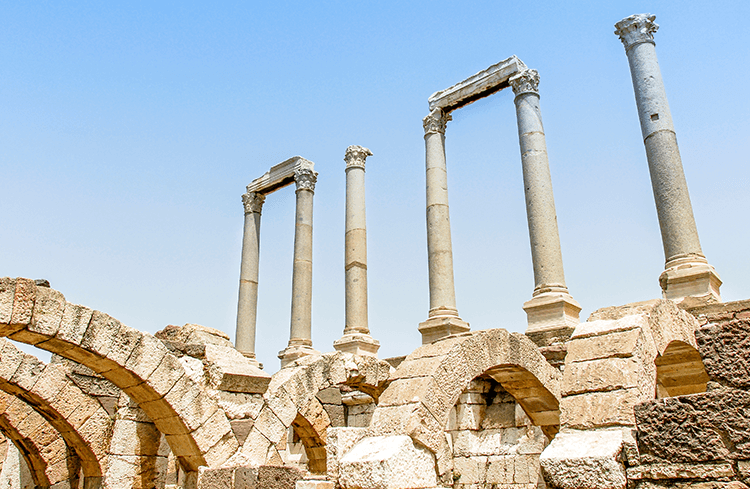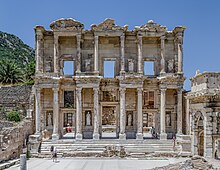
Smyrna in ancient times was a very wealthy and powerful city, indeed it
vied with Ephesus and Pergamon for influence in the region. Today,
Smyrna is located within modern-day İzmir, a city that has almost
continuously been inhabited for centuries. The ancient city of Smyrna
was largely absorbed into the city and, as such, there are remnants of
ancient life throughout. The most important historical structure is the
Agora, one of the best-preserved structures of ancient Ionia.
Christianity in Smyrna is thought to have developed out of the large
Jewish population that used to live in the area, as people defected from
Judaism and were baptised in the Christian faith.
İzmir Current day Smyrna

Revelation 2
To the Church in Smyrna
8 “To the angel of the church in Smyrna write:
These are the words of him who is the First and the Last, who died and came to life again. 9 I know your afflictions and your poverty—yet you are rich! I know about the slander of those who say they are Jews and are not, but are a synagogue of Satan. 10 Do not be afraid of what you are about to suffer. I tell you, the devil will put some of you in prison to test you, and you will suffer persecution for ten days. Be faithful, even to the point of death, and I will give you life as your victor’s crown.
11 Whoever has ears, let them hear what the Spirit says to the churches. The one who is victorious will not be hurt at all by the second death.
----------------------------------------------------------------------
Titus 1
Titus 1
New International Version
1 Paul, a servant of God and an apostle of Jesus Christ to further the faith of God’s elect and their knowledge of the truth that leads to godliness— 2 in the hope of eternal life, which God, who does not lie, promised before the beginning of time, 3 and which now at his appointed season he has brought to light through the preaching entrusted to me by the command of God our Savior,
4 To Titus, my true son in our common faith:
Grace and peace from God the Father and Christ Jesus our Savior.
Appointing Elders Who Love What Is Good
5 The reason I left you in Crete was that you might put in order what was left unfinished and appoint[a] elders in every town, as I directed you. 6 An elder must be blameless, faithful to his wife, a man whose children believe[b] and are not open to the charge of being wild and disobedient. 7 Since an overseer manages God’s household, he must be blameless—not overbearing, not quick-tempered, not given to drunkenness, not violent, not pursuing dishonest gain. 8 Rather, he must be hospitable, one who loves what is good, who is self-controlled, upright, holy and disciplined. 9 He must hold firmly to the trustworthy message as it has been taught, so that he can encourage others by sound doctrine and refute those who oppose it.
Rebuking Those Who Fail to Do Good
10 For there are many rebellious people, full of meaningless talk and deception, especially those of the circumcision group. 11 They must be silenced, because they are disrupting whole households by teaching things they ought not to teach—and that for the sake of dishonest gain. 12 One of Crete’s own prophets has said it: “Cretans are always liars, evil brutes, lazy gluttons.”[c] 13 This saying is true. Therefore rebuke them sharply, so that they will be sound in the faith 14 and will pay no attention to Jewish myths or to the merely human commands of those who reject the truth. 15 To the pure, all things are pure, but to those who are corrupted and do not believe, nothing is pure. In fact, both their minds and consciences are corrupted. 16 They claim to know God, but by their actions they deny him. They are detestable, disobedient and unfit for doing anything good.
Footnotes
- Titus 1:5 Or ordain
- Titus 1:6 Or children are trustworthy
- Titus 1:12 From the Cretan philosopher Epimenides
Smyrna was a large, important city on the
western coast of Asia Minor, famed for its schools of medicine and
science. The words of Jesus to the church in Smyrna in Revelation 2:8-11 offer insight into the life of a first-century congregation, and there are many applications for today’s believers.
The message was from the Lord Jesus Christ: “These are the words of him
who is the First and the Last, who died and came to life again” (Revelation 2:8). The identity of the first and the last and the resurrected one could only be Jesus Christ (see Revelation 22:13).
Jesus starts by acknowledging their trials: “I know your afflictions and
your poverty—yet you are rich! I know the slander of those who say they
are Jews and are not, but are a synagogue of Satan” (Revelation 2:9).
In their physical poverty, however, the church of Smyrna was “rich”;
that is, they had spiritual wealth that no one could take away (Matthew 6:20).
As for the identity of the “synagogue of Satan,”
there are a couple of views. One is that this was a group of Gentiles
who called themselves “Jews” (i.e., the chosen people of God). Instead
of following Judaism, however, these self-proclaimed “people of God”
worshiped the Roman emperor and spoke out against the Christians in
Smyrna.
Another view is that the “synagogue of Satan” was a group of physical
Jews who followed tradition and the Mosaic Law yet in reality did not
know God. They were “not” Jews in the sense that they did not have the
faith of their father Abraham (Luke 3:8; John 8:40), and they were “of Satan” in that they had rejected Jesus Christ (John 8:44). Jesus dealt with many such religious leaders, as did the apostle Paul (Matthew 23; Acts 18:6).
In fact, Paul differentiates “true” (spiritual) Jews from those who can
only claim a physical connection to Abraham: “A man is not a Jew if he
is only one outwardly, nor is circumcision merely outward and physical.
No, a man is a Jew if he is one inwardly; and circumcision is
circumcision of the heart, by the Spirit, not by the written code” (Romans 2:28-29).
Adding weight to the latter view is the fact that Polycarp was martyred
in Smyrna around A.D. 155. At Polycarp’s trial, the unbelieving Jews of
Smyrna joined with the pagans in condemning him to death. Eusebius
writes that “the Jews, being especially zealous . . . ran to procure
fuel” for the burning (The Ecclesiastical History 4:15).
After commending the church in Smyrna for their spiritual victories,
Jesus warned of coming persecution: “You are about to suffer. I tell
you, the devil will put some of you in prison to test you, and you will
suffer persecution for ten days” (Revelation 2:10).
Some of the church members would be imprisoned, and this wave of
persecution would last for ten days. However, Jesus gives hope to His
church: “Do not be afraid,” He says. The Smyrnan believers would have
the courage to face the trial (Matthew 5:11-12).
Jesus calls them to remain faithful in their suffering: “Be faithful,
even to the point of death, and I will give you the crown of life” (Revelation 2:10).
Here, a specific crown is mentioned for those who die as a result of
suffering for Christ. This same “martyr’s crown” is also mentioned in James 1:12:
“Blessed is the man who perseveres under trial, because when he has
stood the test, he will receive the crown of life that God has promised
to those who love him.”
Jesus makes a final promise to the believers in Smyrna: “He who overcomes will not be hurt at all by the second death” (Revelation 2:11). The overcomers, or “conquerors,” refer to all believers (1 John 5:4-5). The second death is a reference to the final judgment of the wicked (Revelation 20:6, 14; 21:8).
Believers will not be hurt “at all” by that judgment; their sin was
judged at the cross, and, in Christ, there is no more condemnation (Romans 8:1).
Martyrdom of Polycarp
Jump to navigation Jump to search St Polycarp, Bishop of Smyrna | |
| Author | Church Fathers |
|---|---|
| Language | Greek, Latin |
| Subject | Hagiography |
| Set in | 2nd century |
| Published |
|
| Text | Martyrdom of Polycarp at Wikisource |
Martyrdom of Polycarp is a manuscript written in the form of a letter that relates the religious martyrdom of Polycarp, Bishop of Smyrna (the site of the modern city of Izmir, Turkey) and disciple of John the Apostle in the 2nd century AD. It forms the earliest account of Christian martyrdom outside of the New Testament. The author of Martyrdom of Polycarp is unknown, but it has been attributed to members of the group of early Christian theologians known as the Church Fathers. The letter, sent from the church in Smyrna to another church in Asia Minor at Philomelium, is partly written from the point of view of an eye-witness, recounting the arrest of the elderly Polycarp, the Romans' attempt to execute him by fire, and subsequent miraculous events.[1][2]
The letter takes influence from both Jewish martyrdom texts in the Old Testament and the Gospels. Furthermore, the Martyrdom of Polycarp promotes an ideology of martyrdom, by delineating the proper conduct of a martyr.
------------------------------------
Popular evangelical author Hal Lindsey, famous for his best-selling book, The Late Great Planet Earth, follows other dispensationalists in his interpretation of the seven churches. He believes that the seven churches were literal assemblies that existed in Asia Minor at the time John wrote, and that they prophetically describe seven ages extending from the apostolic church to the church of the last days. He presented the following associations in There’s A New World Coming, his commentary on the book of Revelation:
- The Church in Ephesus: Apostolic Church (A.D. 33–100)
- The Church in Smyrna: Era of Persecution Under the Ten Caesars (A.D. 100–312)
- The Church in Pergamum: Era of Church-State Union (A.D. 312–590)
- The Church in Thyatira: Era Spanning the Middle Ages (A.D. 590–1517)
- The Church in Sardis: Protestant Reformation (A.D. 1517–1750)
- The Church in Philadelphia: Era of Revival and Great Awakening (A.D. 1750–1925)
- The Church in Laodicea: Era of “Higher Criticism” (A.D. 1900–Tribulation)
https://www.cgi.org/the-seven-churches-of-the-apocalypse
------------------------------------------
The Meaning of the Seven Churches Names
1. EPHESUS – ‘desired’ They were desired by their Lord.
2. SMYRNA – ‘myrrh’ or ‘bitterness’ through death. This is a type of the suffering Church in any century.
3. PERGAMOS or PERGAMUM – means ‘high towers’ or ‘thoroughly married’. (The Church to the State!)
4. THYATIRA – means ‘perpetual sacrifice’ or ‘a continual offering’. (ie. Transubstantiation/Rome)
5. SARDIS – means ‘those escaping’ (The Reformers coming out with others from Roman Catholicism)
6. PHILADELPHIA – means ‘brotherly love’. (Church now grows worldwide through correct doctrine. This then is the Church to emulate.)
7. LAODECIA – this means ‘the people ruling’ or ‘the judgement of the people’. Here is the last Church Age or Period. It is the worst of the cameo or types of Churches seen. The Lord does not really reign in their midst – they do!
--------------------------------------------------------------
Roman Emperors
95 Domitian
112 Trajan
177 Marcus Aurelius (cf. the famous martyrdoms at Lyon)
211 Septimus Severus
235 Maximus Thrax
250 Decius
257 Valerian
303 Diocletian
323 Licinius
361 Julian
------------------------------------------------------





